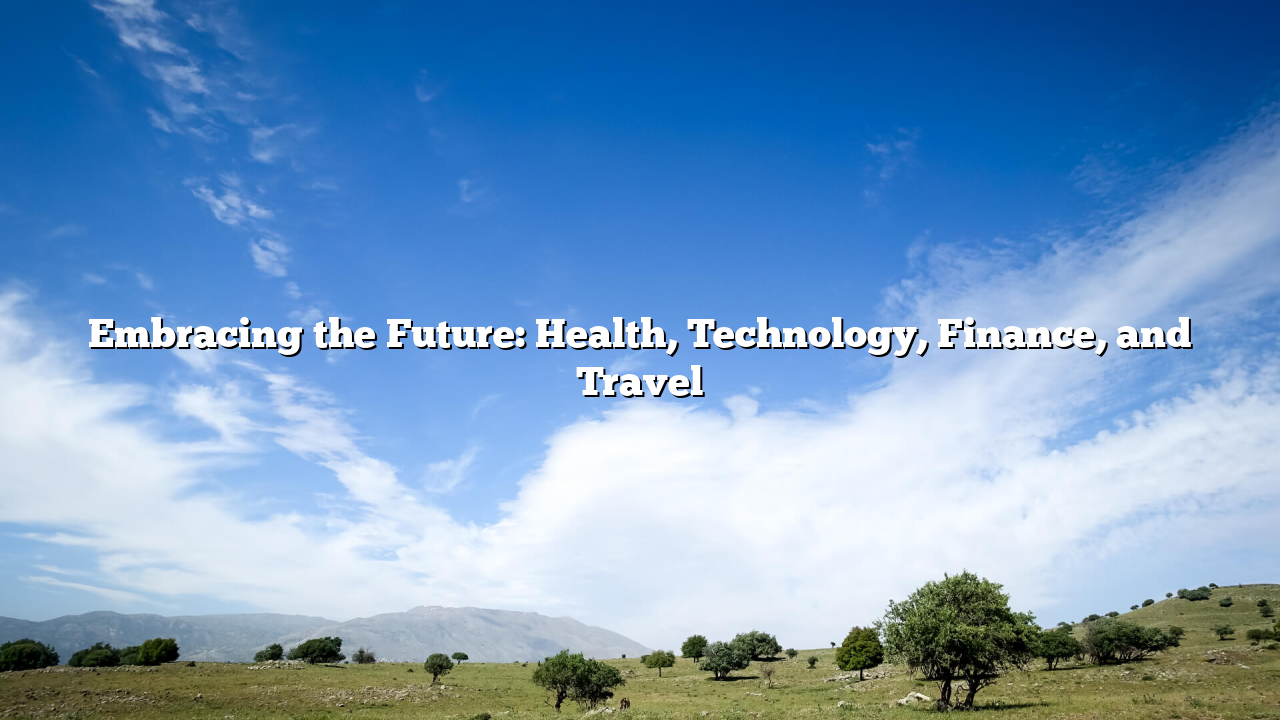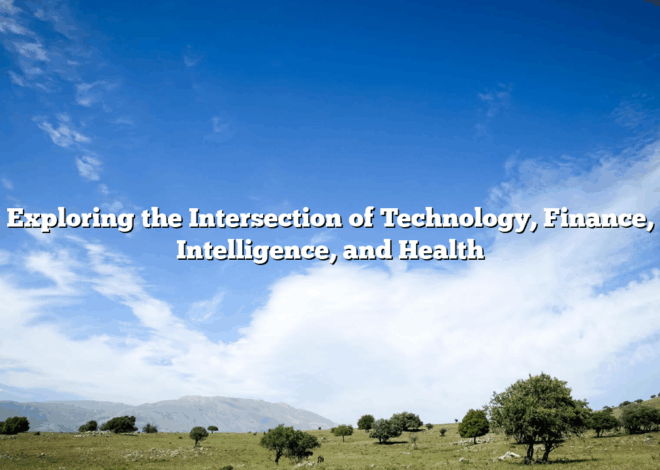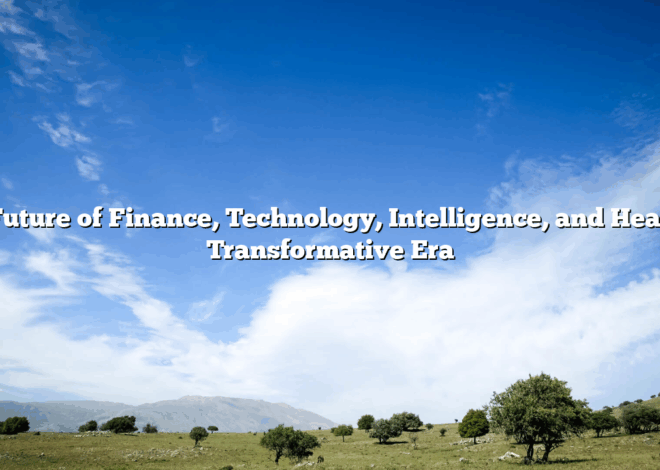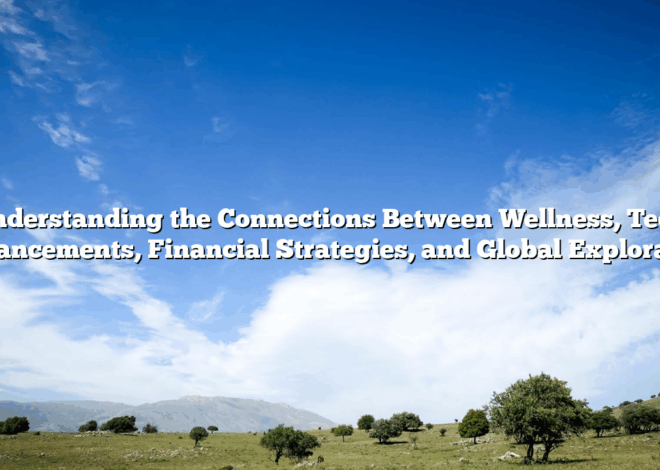
Embracing the Future: Health, Technology, Finance, and Travel
In today’s rapidly evolving world, four key areas are significantly shaping our lives: health, technology, finance, and travel. These sectors are not only interconnected but also influence how we live, work, and explore the world. With advancements in technology, new financial tools, healthcare innovations, and global travel possibilities, each of these areas presents exciting opportunities and challenges. This article will delve into each sector, exploring their current trends, innovations, and impacts on society.
Healthcare has undergone tremendous transformations over the last few decades, with the advent of new technologies, treatments, and medical breakthroughs. From telemedicine to artificial intelligence (AI) in diagnostics, the healthcare industry is evolving faster than ever. The COVID-19 pandemic, for instance, accelerated the adoption of telemedicine, allowing patients to consult doctors and healthcare professionals virtually, reducing the strain on healthcare facilities and providing safer options for those unable to visit in person.
Technology plays a critical role in modern healthcare by enabling faster, more accurate diagnoses. For instance, AI-powered tools are now being used to analyze medical images, predict disease outcomes, and recommend personalized treatment plans. These technologies have the potential to reduce human error and increase the efficiency of healthcare systems globally. Moreover, wearable devices, such as fitness trackers and smartwatches, are empowering individuals to take control of their health by monitoring vital signs and encouraging healthy habits.
When it comes to finance management, technology has revolutionized the way we handle money. The rise of digital banking, cryptocurrencies, and fintech solutions has disrupted traditional banking systems. Mobile payment apps like PayPal, Venmo, and Apple Pay are now common, making transactions faster and more convenient. Moreover, blockchain technology has enabled the development of cryptocurrencies like Bitcoin and Ethereum, which have gained significant attention and adoption in recent years.
In terms of investments, robo-advisors have become popular tools for individuals seeking personalized financial advice without the need for human financial planners. These AI-powered platforms analyze user preferences, goals, and risk tolerance to suggest tailored investment portfolios. The growth of such platforms has democratized financial planning, making it accessible to a broader audience and allowing people to manage their finances with ease.
In the realm of travel, technology has revolutionized the way we organize and experience our vacations. Travel apps, booking platforms, and digital itineraries have simplified the process of booking flights, hotels, and activities. With the rise of services like Airbnb, travelers now have access to unique accommodations, ranging from cozy apartments to luxurious villas, often at more affordable prices than traditional hotels.
Technology also plays a role in enhancing the overall travel experience. Virtual reality (VR) and augmented reality (AR) are being used to provide immersive experiences for travelers. For example, VR allows individuals to virtually explore destinations before booking a trip, helping them make more informed decisions. AR, on the other hand, can be used for navigation, offering real-time directions and local information through smartphones or wearable devices.
One of the biggest advantages of modern technology in travel is its ability to connect people across the globe. Social media platforms and travel blogs allow individuals to share their experiences and recommendations, creating a global community of travelers. samosir88 serve as a source of inspiration but also provide valuable insights into destinations, local culture, and hidden gems that might not be found in traditional travel guides.
The intersection of health, technology, finance, and travel is evident in the growing trend of wellness tourism. As people become more health-conscious, many are seeking vacations that promote well-being and relaxation. Wellness retreats, fitness vacations, and spa getaways are becoming increasingly popular. These travel experiences are often complemented by advanced technologies that track and improve health metrics, such as sleep patterns, stress levels, and physical activity, ensuring that travelers can fully benefit from their wellness journey.
Moreover, the financial aspect of travel has also evolved, with the rise of travel rewards programs and budgeting apps that help individuals save money while exploring new destinations. Credit cards with travel perks, loyalty programs, and discounts on travel services have become essential tools for frequent travelers. This has made travel more accessible to a wider range of people, allowing them to enjoy global experiences without breaking the bank.
While these advancements in health, technology, finance, and travel offer numerous benefits, they also come with certain challenges. In the healthcare sector, the increasing reliance on technology raises concerns about data privacy and the security of personal health information. Cybersecurity breaches could compromise sensitive patient data, leading to potential risks in the healthcare system.
In finance, the rise of digital currencies and fintech solutions has raised questions about regulation and the security of online transactions. While cryptocurrencies offer great potential for financial innovation, their volatility and lack of regulatory oversight pose significant risks for investors. The shift toward digital banking also brings challenges for traditional financial institutions, which must adapt to a rapidly changing landscape.
For the travel industry, the ongoing challenges of global pandemics, climate change, and geopolitical tensions continue to affect the way we travel. Health and safety concerns, coupled with the environmental impact of travel, have led to a growing demand for sustainable tourism practices. Many travelers are now seeking eco-friendly destinations, accommodations, and transportation options that minimize their carbon footprint.
As we look toward the future, it is clear that health, technology, finance, and travel will continue to evolve in ways we cannot yet fully predict. The integration of AI, big data, and other emerging technologies will further shape these industries, offering new solutions to old problems. However, as these fields progress, it is important to remain mindful of their impact on society, ensuring that innovation is balanced with ethical considerations and sustainability.
In conclusion, the interconnection of health, technology, finance, and travel offers exciting opportunities for individuals and businesses alike. The advancements in these sectors have the potential to improve quality of life, increase financial security, and open up new possibilities for global exploration. However, it is important to navigate these changes carefully, considering both the benefits and the challenges they present. By doing so, we can embrace a future that is not only more connected but also more sustainable and equitable for all.


